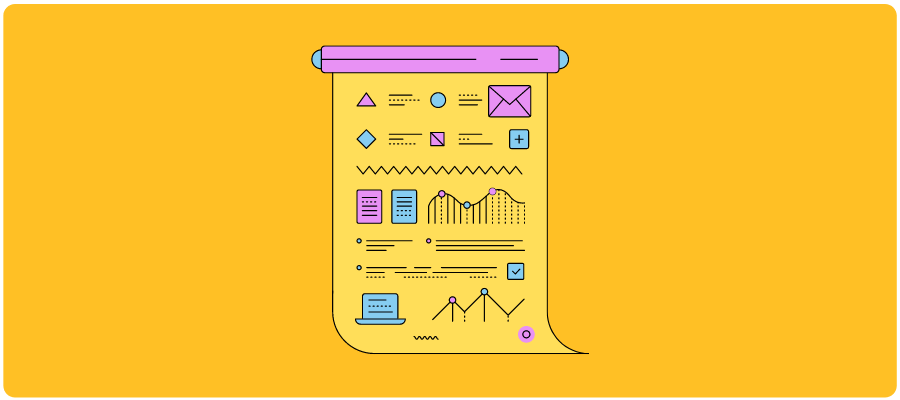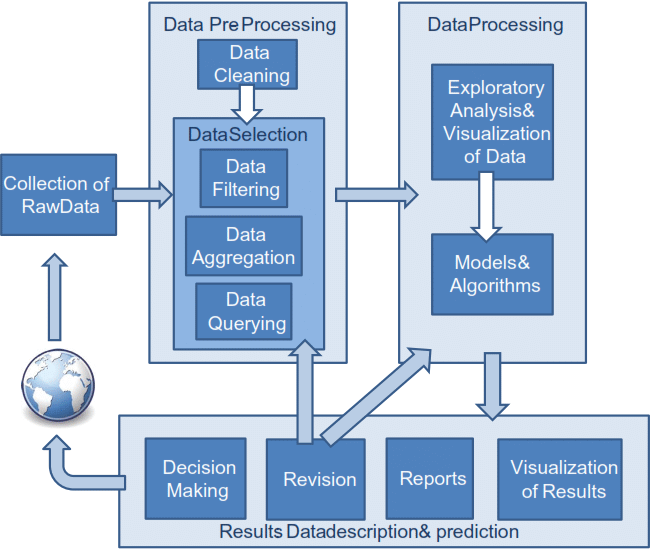Data science and business analytics have become the hottest jobs of the century. These two fields share many similarities but are vastly different.
In this guide, we will learn what these two career paths will look like, the difference between them, and what skills you need to succeed in this career path.
📌 Table of Contents
What is Data Science?
Data science is a multidisciplinary field of raw and unstructured data, where it comes from, what it represents, and how it can be transformed into valuable inputs and resources for the business.
Data science uses statistical methods, computer science, machine learning, and mathematics to pass through big data to estimate the unknown by asking questions.
What is Business Analytics?
Business analytics is the use of data, statistical and quantitative analysis, explanatory and predictive models, and fact-based management to drive decisions and actions.
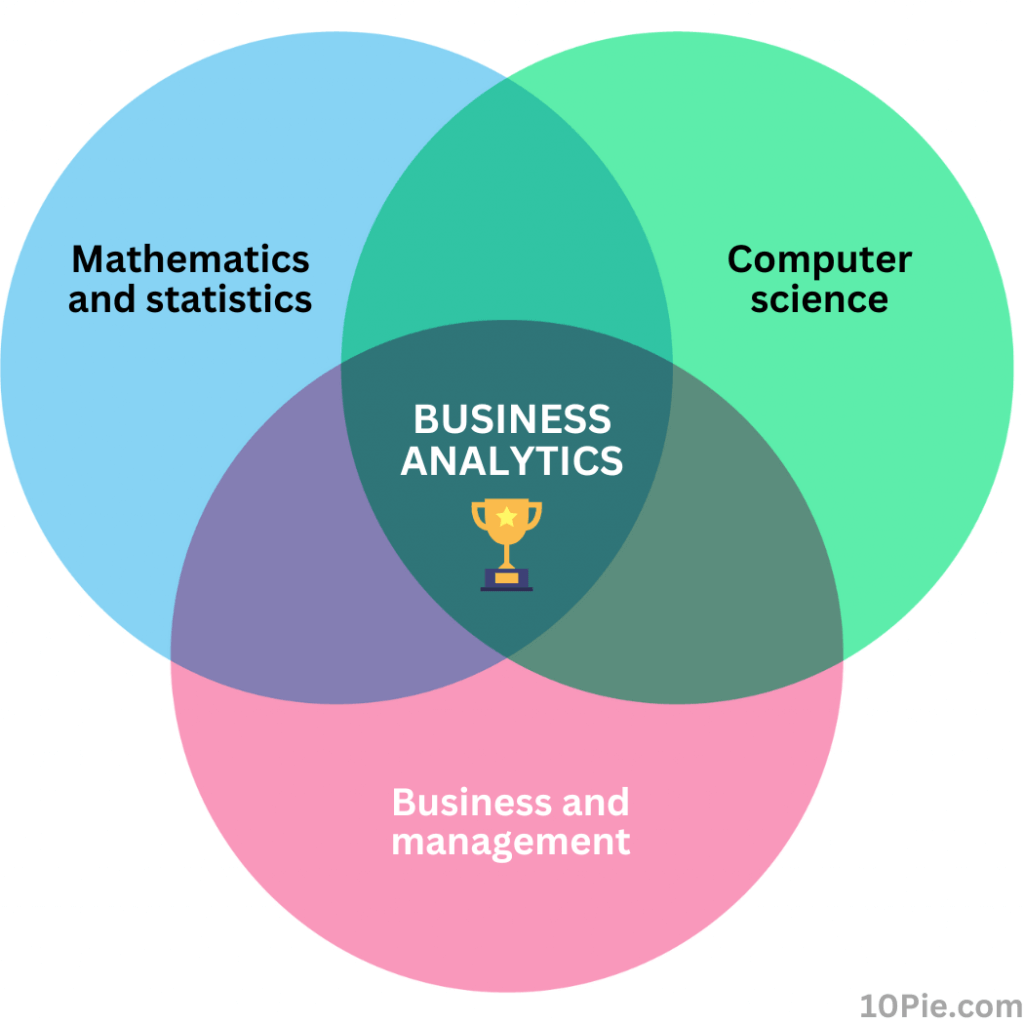
Data analysis focuses on processing and performing statistical analysis on existing datasets.
Data analytics uses statics in a much broader sense than data science, which helps combine diverse sources of data and find meaningful insight by simplifying the results.
In this sense, data analytics doesn’t necessarily require in-depth knowledge of the subject and is mostly working on statistics and business intelligence. Still, it can be supplemented by learning the tools needed to analyze data like Power BI and Tableau.
Differences between Data Science and Business Analytics
Here are key differences between data science and business analytics based on key factors such as:
- Definition
- Statistics
- Applications
- Challenges
- Coding skills
- Tools and languages
- Data
- Future trends
1. Definition
Data science:
Data science is the study of data using technology, statistics, and algorithms.
Business analytics:
Business Analytics uses statistical concepts to extract insights from businesses to solve real-world complex problems.
2. Statistics
Data science:
Mastering data science involves various techniques and methods such as general statistics, probability distributions, dimension reduction, Bayesian statistics, and more.
This includes tasks such as data cleaning, exploration, and visualization, as well as building models to make predictions or identify patterns.
Data science can be applied to a wide range of industries and domains, such as healthcare, finance, and technology.
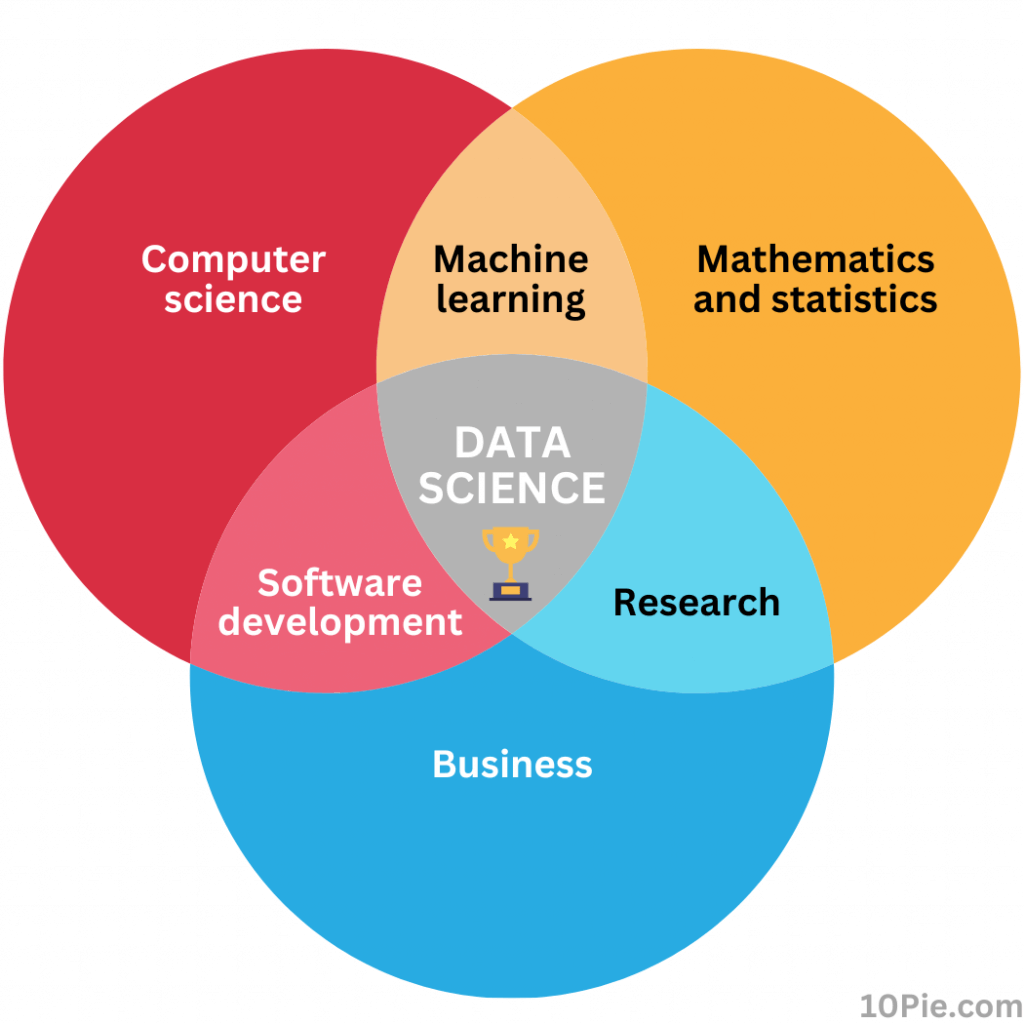
📌 Related guide: Data science lifecycle: six stages of data science
Business analytics:
Business analytics is more focused on using data to inform and support business decision-making. This can include tasks such as forecasting, budgeting, and identifying areas for cost savings or process improvement.
Business analytics is typically applied within the context of a specific organization or industry, such as retail or manufacturing.
📌 Related guide: Data science lifecycle: six stages of data science
3. Applications
Data science:
Used in industries like technology, finance, internet-based, and academic.
For example, a data scientist may use machine learning to develop a predictive model that can identify patients at high risk of developing a certain disease or use natural language processing to analyze customer feedback and identify key themes.
Business analytics:
Used in industries like technology, fintech, technology, CRM/marketing, and retail.
This can include tasks such as forecasting, budgeting, and identifying areas for cost savings or process improvement.
In short: Business analytics is typically applied within the context of a specific organization or industry, such as retail or manufacturing.
4. Challenges
Data science challenges:
- Not being able to use the Results in organizational decision-making
- Decision-makers in business do not use the results of data science
- There is a lack of clarity about the questions that must be answered using the given data set
- Data not being available and could be difficult to access
- Coordination with IT is required
Business analytics challenges:
- Lack of strong domain experts’ input.
- soiled data
- Data not available or difficult to access
- Privacy concerns about not having enough money to purchase useful data sets from outside sources
- fail to integrate findings into organizational decision-making
- Uncertainty over the questions that the available data set should be used to address.
- Tool limitations
- Coordination with IT is required
5. Coding skills
Data science: If you want to become a data scientist, then having a solid grip on coding skills is necessary. This includes learning programming languages, libraries, and frameworks to perform data cleaning, exploration, visualization, and modeling.
For example, a data scientist may use Python to perform data cleaning and exploration, libraries such as pandas, NumPy, and scikit-learn, or use R to perform statistical modeling.
📌 Related guide: Required skills, roles & responsibilities of data science
Business analytics: Coding skills are also required in the business analytics field. However, the primary focus here is tools and technologies used for business applications.
For example, a business analyst may use Excel and VBA to perform data analysis projects, create reports, or use SQL to retrieve and manipulate data from databases.
📌 Related guide: Required skills, roles & responsibilities of data science
6. Tools and languages
Required tools and languages for data science:
- Python
- R
- Matlab
- Pandas
- Matplotlib
- Numpy
- Keras
- Tensorflow
- PyTorch
- Sci-kit-learn
- GraphQL)
- Apache Spark
- SQL (ex-MySQL, PostgreSQL, Oracle)
- NoSQL (MongoDB, Cassandra DB,
- Jupyter/Spyder Notebook
- Natural Language Toolkit
Required tools and languages for business analytics :
- Excel
- Tableau
- Power BI
- SQL
- Python
- Dash
- SAS
- Pencil
- JIRA
- Oracle Analytics Cloud
7. Data
Data science: Both structured and unstructured data is required in this field.
Business analytics: Mostly structured data is required and used.
8. Future trends
Data science: Artificial Intelligence and machine learning are future trends in this field.
Business analytics: Cognitive analytics and tax analytics are future trends in this field.
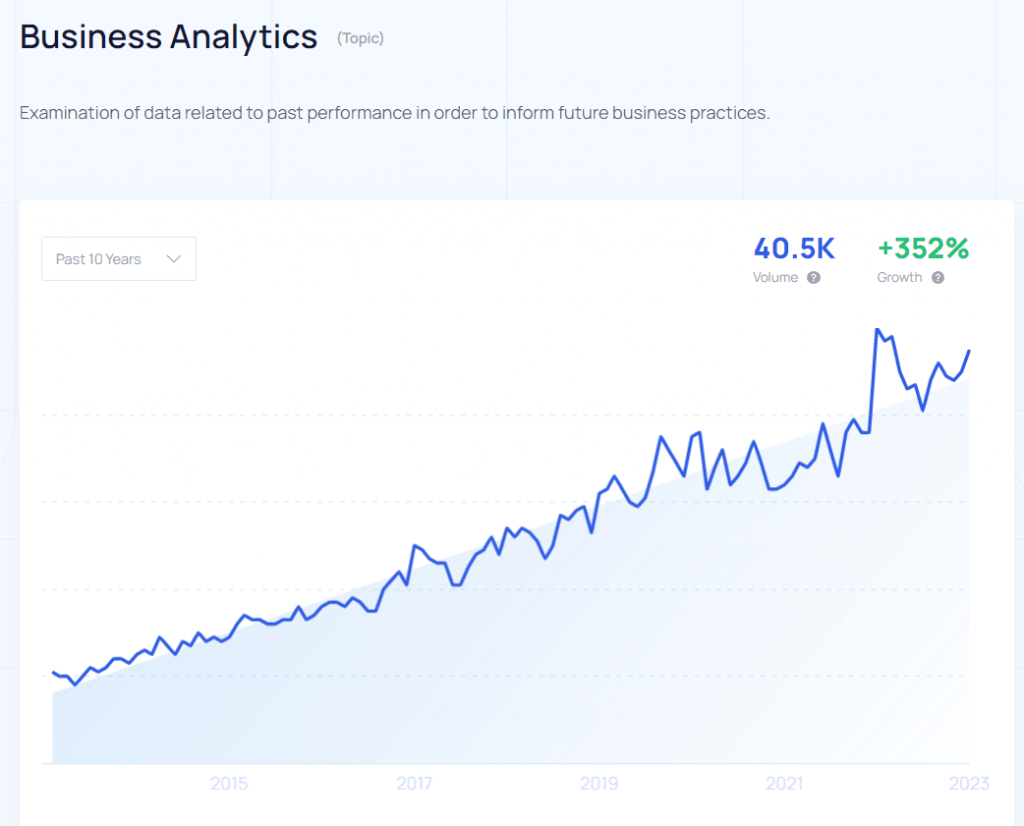
📌 Related read: Discover the latest technology trends and their career opportunities
Key required skills to become a data scientist
The following are some of the most crucial technical and non-technical data scientist skills:
1. Mathematics and Statistics
You don’t need any prior knowledge of mathematics to begin learning data science, but without understanding some mathematical and statistical ideas, you won’t improve in your career.
Building solid data models, selecting and utilizing the various data techniques available, and properly understanding the data you are working with all require a solid understanding of statistics.
You should spend some time learning the fundamentals of calculus, probability, statistics, and linear algebra in addition to the very fundamentals of math given in a normal school curriculum. If you deal with AI and machine learning approaches, knowledge of Bayesian theory is also helpful.
2. Programming
It’s all meaningless if you don’t know how to Code. Therefore, in order to modify the data and apply various sets of algorithms as and when necessary, working as a data science expert would demand you to be familiar with a number of programming languages. However, there are a few important languages that data scientists frequently use, and more importantly, the recruiter will demand that you know these languages.
The list of programming languages is as follows:
- Python
- R Programming
- SQL
- Scala
3. Big Data
Relying simply on Python or R may not be adequate when it comes to processing large amounts of complicated data quickly. The rapidly expanding tools and technology that make up the big data ecosystem enable more efficient, scalable, and reliable big data analysis. These activities include everything from ETL procedures and database maintenance to real-time data analysis and activity scheduling.
4. Machine Learning and Deep Learning
One of the hottest subjects in data science is machine learning. A subfield of artificial intelligence called machine learning is concerned with creating algorithms that can learn to carry out tasks without being explicitly programmed.
When hiring or promoting data scientists, having knowledge of neural network theory and practice is a game changer. Deep learning, however, is a challenging field that requires highly developed math and computer skills. Deep learning specialists are among the highest paid in the data science sector because of this.
5. Data Visualization
A key requirement of being a data scientist is being able to effectively communicate important ideas and gain support for suggested solutions. One ability that every data scientist will need to be adept at in order to grow professionally is understanding how to break complex data down into smaller portions as well as utilizing a number of visual tools (charts, graphs, and more).
6. Great Data Intuition
Large data sets may not necessarily provide valuable data insights; a skilled data scientist has intuition and knows when to dig further for useful data insights. This increases the productivity of data scientists, and it can be learned with practice and appropriate education. But experience is necessary to develop this data scientist skill, and boot camps are a terrific way to do that.
7. Strong Communication Skills
Communication is the next skill on the list of important data scientist skills. Data scientists are skilled in extracting, comprehending, and analyzing data.
However, you must be able to effectively explain your results to team members that come from different professional backgrounds if you want to succeed in your position and help your organization.
8. Strong sense of business
Technical skills can be most effectively applied when combined with a strong business sense. Without it, an aspiring data scientist might not be able to identify the issues and the difficulties that need to be overcome for a company’s growth.
This is important for helping the company you work for in exploring different business opportunities.
Responsibilities of a data scientist
- Identify useful data sources and automate data collection procedures
- Preprocess data, both structured and unstructured, and analyze a lot of data to find patterns and trends
- Create machine learning algorithms and predictive models
- By using ensemble modeling, combine models
- Use data visualization tools to present information
- Bring up strategies and solutions for corporate problems
- Work together with the product development and engineering teams
- Data collection and source identification
- Analyse massive amounts of data, both structured and unstructured
- Create strategies and solutions for corporate issues
- Use a variety of algorithms and modules to identify trends and patterns
Want to start your data science journey? Check out these courses ranked by placement assistance, reviews, and pricing.
Required skills of a business analyst
1. Domain Knowledge
The first stage in a business analyst’s career is understanding the business Domain, which is a unique skill of its own. Business analysts should have domain knowledge of the company they are working for. This will help them in completing the required targets. Business analysts typically strive to bring about a change with the aim of boosting sales, accelerating manufacturing, raising revenue streams, etc.
2. Analytical Skills
Business analysts focus on learning about and addressing the needs of the client. They are able to prioritize business requirements thanks to critical thinking. Before choosing the desired solution, a business analyst should evaluate a number of options with the use of critical thinking and Analytical Skills.
A good analytical bent of mind will allow a business analyst in achieving the stated goals even when resources are limited and conditions are less than ideal.
3. Microsoft Excel
Business analysts execute several calculations, data analysis, and budget analysis using Excel, one of the most established and efficient analytics and reporting tools.
Excel is used to organize an editorial calendar, list expenses for items, produce charts to indicate how near the product is to budget across each category, and create revenue growth models for new products based on current consumer estimates.
4. SQL
Business analysts use structured data the most frequently. They should be well-versed in relational databases like Microsoft SQL Server, MySQL, and Oracle DB, as well as NoSQL databases in order to store and process this large amount of data.
Every business analyst needs to have practical SQL experience. They can access, retrieve, manipulate, and analyze data with the use of this.
They must create, update, insert, delete, select, and other data definition and data manipulation commands.
5. Programming
To execute data analysis more quickly and effectively, business analysts should have practical programming skills. Learning R and Python is quite helpful. Writing effective codes can be used to resolve complex issues. Several tools and packages for data wrangling, data manipulation, data visualization, and analytics are available in R and Python. Additionally, proficiency with statistical programs like SAS and SPSS is recommended.
6. Negotiation Skills
Business analysts bargain during every stage of a project. Negotiation skills are used in the early stages of a project to determine what must be included in the project’s vision.
After that, business analysts utilize their negotiation skills to decide which requests become requirements and what priority they should be given. Negotiation abilities are essential when determining the functional design that meets the criteria as the project moves forward.
Technical decisions are also made through negotiation techniques.
7. Data Visualization
For the purpose of developing reports and dashboards, business analysts need to be skilled users of a variety of business intelligence and data visualization tools. To help with decision-making, business analysts create general reports and dashboard reports.
To create various reports based on business needs, solid knowledge of Tableau, QlikView, and Power BI is required.
8. Strong Communication Skills
Understanding is important, but so is being understood. A data analyst should be able to explain the needs to clients and stakeholders in a clear and simple manner.
At various stages of a project, such as when it is being launched, while collecting and analyzing data, when working with stakeholders, while validating the final solution, and so on a business analyst needs communication and interpersonal skills.
Responsibilities of a business analyst
- Monitoring corporate processes, witnessing needs, creating, and implementing solutions
- Keeping up with new technology to automate tasks and boost productivity
- Examining corporate procedures and giving management and other team members feedback
- Forecasting and planning
- Coordinating initiatives while keeping a continuous eye on needs in charge of pricing
- Carrying out comprehensive market research and competitive analysis
- Analyses and Reporting regularly
- Managing overlapping resources and priorities while maintaining frequent delivery checks
- Overall project management
- managing and leading teams
Data Science and Business Analytics: Which one should you choose?
Both Data Science and Business Analytics are equally hot in the market. It depends on what you want to pursue soon after receiving your degree in the near future.
If you are from a management background business analytics is a suitable career option as it requires less coding. Getting a master’s in Business Analytics will be the best option to start your career in this field.
Technical background students can go for data science as this field requires lots of coding. You can go for a master’s in data analytics. This will help you in your career as a Data Scientist.
Can a business analyst become a data scientist?
Yes, a business analyst can become a data scientist. It is an ideal role for someone who wants to become a data scientist. For this, you need to Brush up the skills like statistics and maths. Learn to code in languages like Python and R.
If you have some coding knowledge under your belt, try taking them to the next level. Taking Tests and quizzes and joining groups and the data science community would certainly help you in this case.
Can I change from business analyst to data analyst?
Yes, with proper training in business, analysts can switch to data analysis. For a smooth transition into these professions, individuals must be comfortable with coding and programming.
Business analysts and data analysts are two different sides of the same coin. Business analysts are more involved in addressing business issues and making recommendations with business intelligence, whereas data analysts work more directly with the data itself.
Final Words
Data analysts and data scientists have job titles that are deceptively similar given the many differences in educational requirements, roles and responsibilities, and career trajectories.
Both Data science and data analysis have great job opportunities. Still, when it comes to career growth, data science is the best option as it has different types of Data Science Jobs options including data engineer and Database Manager. On the other hand, career growth options are yet to be discovered in the field of business analytics.

Article by
Samruddhi Chaporkar
Samruddhi is a Technical Content Writer of science and technology with an academic qualification in Bachelors in Computer Applications (BCA). Her love for writing and knowledge of computer science helps her write about trends in the technology industry that help people understand the ins and outs of the world of technology.

